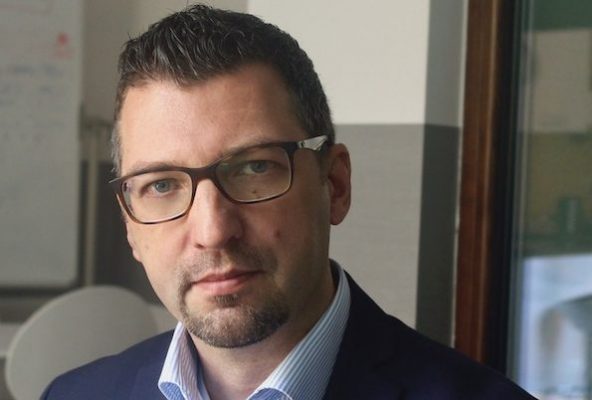Interview with Srđan Majstorović: CSO’s a can contribute substantially to a better understanding and faster reconnection of the region
CEP is one of the co-founders of the regional Think for Europe Network and its Secretariat. One of the main focuses of CEP’s work is regional cooperation. Why do you think regional cooperation between think tanks is important?
CEP is very proud to be part of TEN. It represents a network of distinguished think tank organisations dedicated to the most valiant goal – enhancing the quality of public services for citizens of the countries of the region by offering evidence-based alternatives. Having in mind all the normative, institutional and even cultural challenges regarding creating and monitoring of public policies in the countries of the region, it is obvious that jointly, as a network of organisations, we can do more, we can be louder, and our ideas can have a stronger impact.
One of the essential parts of the EU integration process for the countries of the Western Balkans is regional cooperation. Unfortunately, Governments are not leading by example. On the contrary, we are witnesses of their inability to recognize that regional cooperation is not an obligation imposed from the outside, but a necessity. This necessity entails working together on securing a better normative, institutional, social, economic and cultural environment for their citizens. We are concerned and we do want this to change, but we do not want to wait for those who call themselves “leaders”. Instead, we are trying to lead by positive example, and show that organizations from the region can work together for the benefit of their citizens. “Leaders” are welcome to catch up with us.
Recently published Strategy for EU Enlargement has also recognized that Serbia is one of the countries that has made great progress in the EU accession process. Would you agree with this assessment? Would you describe the speed of Serbia’s negotiating process as satisfactory?
The Strategy is stating the obvious. Montenegro and Serbia are the two countries that are negotiating their accession to the EU. But the EU accession process is dynamic, and it cannot be locked in one moment in time. That’s why I strongly believe that the Strategy is providing a positive framework and a credible offer by the EU to all those countries that are ready to prove their credibility and address the challenges – deficiencies of rule of law, corruption, organized crime, state capture by parties and individual interest, authoritarian tendencies, freedom of the media…
The speed of the process is less important than its goal to enable equal legislative, economic and social conditions to Serbia’s citizens, like the ones enjoyed by the citizens of the EU member states. I am convinced that Serbia can do better and go faster. I trust that our administration still has the capacity for that. Unfortunately, this capacity is eroding due to lack of ownership of the EU agenda in different line ministries and Government agencies. Mixed messages coming from the officials confuse the administration and demotivate them. Serbia deserves clear statements from the highest officials that the EU membership is our choice, our wish and our generational chance. No “ifs” and no “buts.

Srđan Majstorović, Chairman of CEP Governing Board
Regarding the Strategy, it has been confirmed that the EU will not allow accession of the states that have bilateral disputes, hence greater cooperation between the Western Balkan states in resolving these disputes is expected. In what way can CSOs speed up this process and contribute to regional reconciliation?
It is obvious that those countries who prove to be incapable of resolving bilateral issues would signal that they didn’t understand the message from the Strategy; that the EU is not ready to import more insatiability. Bilateral issues must be recognized as a historical chance that can be resolved within the context of EU integration of the whole region. If you wish, it can be a chance to reconfirm the very basis on which the EU was established as a peace project. It will require change of mindset and language currently used by regional officials. Closer regional cooperation and rapprochement needs to be recognized as a chance to change the negative image and make the region more appealing to the citizens of the EU.
It is good that the CSO’s from the region decided not to wait for their “leaders”. There are numerous examples of regional networks of CSO’s who are investing significant efforts to bring citizens closer and to motivate them to understand and accept recent history in order to pave a stable foundation for a common future. CSO’s cannot and should not substitute the governments. It is their task to enable the official framework for reconciliation and rapprochement. However, CSO’s are indispensable in creating an atmosphere that is conducive to reaching that result and they can contribute substantially to a better understanding and faster reconnection of the region.
What do you consider to be the biggest challenges civil society in Serbia is facing? To what extent do you believe that civil society organisations (and CEP, in particular) are involved in the EU accession process?
I am cautiously optimistic regarding the role of CSO’s in the EU accession process thus far. National Convention on European Union proved to be a functional and a resilient mechanism for inclusion of CSO’s in the EU accession negotiations. CEP has the honor to chair 3 Working Groups in the National Convention and we were ready from the start to make a substantial contribution to its work. We are strong advocates of strict monitoring of the negotiation process which we understand as a broader responsibility than a simple ticking off the box exercise.
However, the biggest challenge remains how to establish and maintain an atmosphere of constructive dialogue with the government representatives who are sometimes failing to recognize good intentions when CSO’s are being critical of their performance. It is our duty to raise concerns and offer alternative solutions when we recognize that certain obligations are not implemented in a timely manner. Often, this is perceived by government officials as a “political attack” which is far from reality. CSO’s have the right to alarm the public who is the real “boss” to those who they are electing and paying their work. The EU accession process is a long and complex process, thus we would ask for more patience and more dialogue with the civil society in order to have a sustainable environment for future cooperation.
*This interview is produced as a part of the fourth issue of the TEN Newsletter.

